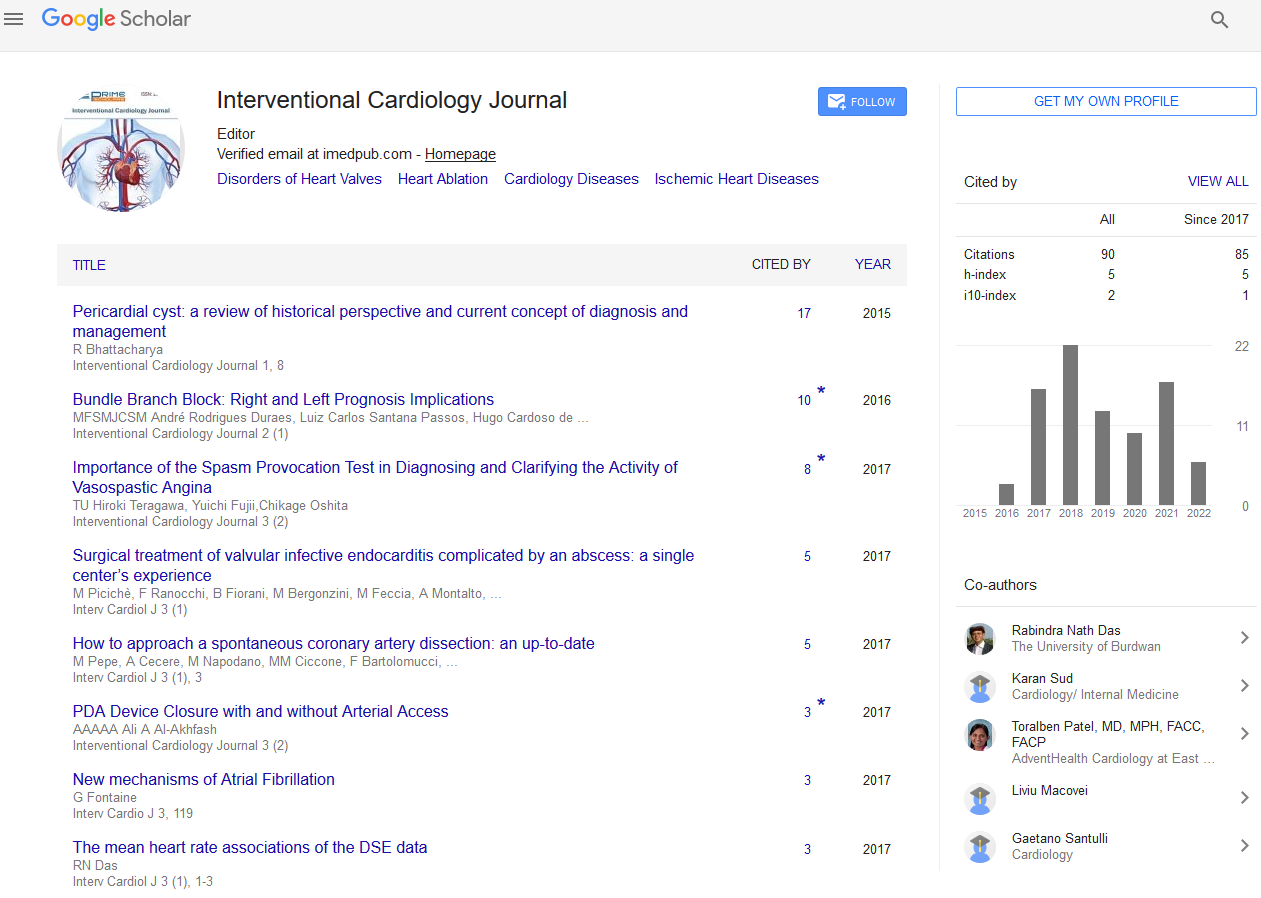Opinion - (2023) Volume 9, Issue 9
The Silent Threat: Understanding the Profound Effects of Diabetes on the Heart
Sasha Gilbert*
Department of Endodontics, University of the Pacific, USA
*Correspondence:
Sasha Gilbert,
Department of Endodontics, University of the Pacific,
USA,
Email:
Received: 30-Aug-2023, Manuscript No. IPIC-23-18073;
Editor assigned: 01-Sep-2023, Pre QC No. IPIC-23-18073 (PQ);
Reviewed: 15-Sep-2023, QC No. IPIC-23-18073;
Revised: 20-Sep-2023, Manuscript No. IPIC-23-18073 (R);
Published:
27-Sep-2023, DOI: 10.21767/2471-8157.9.9.89
Introduction
Diabetes is a global health crisis that affects millions of people
worldwide. Beyond its well-known impact on blood sugar regulation,
diabetes has a profound and often silent effect on the
heart. In this comprehensive article, we will explore the intricate
relationship between diabetes and heart health. We'll discuss
how diabetes affects the heart, the risk factors involved,
and crucial preventive measures and treatments to safeguard
against cardiovascular complications. Diabetes is a well-established
risk factor for heart disease. People with diabetes are
two to four times more likely to develop cardiovascular complications,
such as Coronary Artery Disease (CAD), heart attack,
stroke, and heart failure. Diabetes affects the heart through
various mechanisms, some of which are outlined below. Elevated
blood sugar levels in diabetes can damage blood vessels,
a condition known as endothelial dysfunction. This damage
impairs the ability of blood vessels to expand and contract,
leading to reduced blood flow to the heart and other vital organs.
Moreover, it promotes the accumulation of plaque (atherosclerosis)
in coronary arteries, increasing the risk of heart
attacks. Chronic inflammation and oxidative stress are common
in diabetes. These processes can trigger the formation of atherosclerotic
plaques and damage heart tissues. Inflammation
plays a significant role in the progression of heart disease in
individuals with diabetes.
Description
Coronary Artery Disease (CAD) is a type of heart disease characterized
by the narrowing or blockage of the coronary arteries,
which supply the heart muscle with oxygen and nutrients.
Diabetes is a significant contributor to the development and
progression of CAD. Diabetes accelerates the formation of atherosclerotic
plaques within coronary arteries. High blood sugar
levels promote inflammation and oxidative stress, causing the
plaque to become unstable and prone to rupture. A ruptured
plaque can lead to the sudden formation of blood clots, blocking
the artery and causing a heart attack. Diabetes can mask
the typical symptoms of angina (chest pain) that often signal
reduced blood flow to the heart. This phenomenon, known as
silent ischemia, makes it challenging for individuals with diabetes
to recognize that they have CAD until a severe event, such
as a heart attack, occurs. Diabetes significantly increases the
risk of heart attacks. Individuals with diabetes are more likely
to develop atherosclerotic plaques that can rupture and block
coronary arteries, leading to a heart attack. Diabetes worsens
the prognosis following a heart attack. People with diabetes
have a higher risk of complications during and after a heart attack,
including heart failure and arrhythmias.
Conclusion
Recovery is often slower, and the risk of subsequent heart attacks
remains elevated. Diabetes poses a significant threat to
heart health, increasing the risk of heart disease, heart attack,
and heart failure. Understanding the complex relationship between
diabetes and the heart is essential for prevention, early
detection, and effective management. By prioritizing lifestyle
modifications, regular monitoring, and adherence to prescribed
treatments, individuals with diabetes can reduce their
risk of heart complications and enjoy a healthier and longer
life. Ongoing research holds the promise of more targeted and
personalized therapies, offering hope for better outcomes in
the future. Research is ongoing to develop medications that
specifically target diabetes-related heart complications. Stem
cell-based treatments may help repair damaged heart tissue.
Acknowledgement
None.
Conflict Of Interest
The author’s declared that they have no conflict of interest.
Citation: Gilbert S (2023) The Silent Threat: Understanding the Profound Effects of Diabetes on the Heart. Interv Cardiol J. 9:89.
Copyright: © 2023 Gilbert S. This is an open-access article distributed under the terms of the Creative Commons Attribution License, which permits unrestricted use, distribution, and reproduction in any medium, provided the original author and source are credited.

